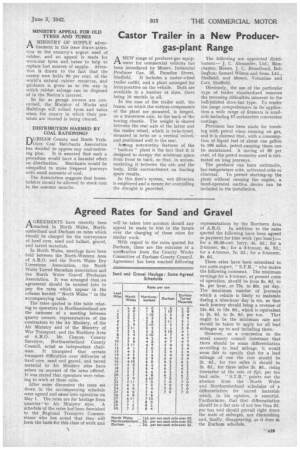Agreed Rates for Sand and Gravel
Page 21

If you've noticed an error in this article please click here to report it so we can fix it.
AGREEMENTS have recently been reached in North Wales, Northumberland and Durham on rates which should be charged for the conveyance of hard core, sand and ballast, gravel, and tarred materials,
In North Wales, meetings have been • held between the North-Western Area of A.R.O. and the North Wales Dry Limestone Association, the North Wales Tarred Macadam Association and the North Wales Gravel Producers Association. It was arranged that an agreement should be entered into to pay the rates which appear in the column headed "North Wales" in the accompanying table.
The rates quoted in this table relating to operators in Northumberland are the outcome of a meeting between quarry owners, representatives of the contractors to the Air Ministry, of the Air Ministry and of the Ministry of War Transport, and the Northern Area of A.R.O. Mr. Cheyne, County Surveyor, Northumberland County Council, acted as independent chairman. It transpired that certain transport difficulties over deliveries of hard core, sand and gravel, and tarred material to Air Ministry sites have arisen on account of the rates offered. It was stated that operators were refusing to work at these rates.
After some discussion the rates set down in the accompanying schedule were agreed and came into operation on May 1. The rates are for haulage from quarries to Air Ministry sites. A schedule of the rates had' been furnished to the Regional Transport Commissioner who has noted that they will _form the basis for this class of work and
will be taken into account should any appeal be made to him in the future over the charging of these rates for similar work.
With regard to the rates quoted for Durham, these arethe outcome of a notification from . the County Works Committee of Durham County Council. Agreement has been reached following representations by the Northern Area of A.R.O. In addition to the rates quoted the following have been agreed as payment for time work (per hour):for a 20-30-cwt. lorry, 5s. 3d.; for a 2-tonner, 6s.; for a 3-tonner, 6s. 7d.; for a 4-tonner, 7s. 2d.; for a 5-tonner, 8s. 6d.
These rates have been submitted to our costs expert, " S.T.R.," who makes the following comment. The minimum earnings for a 5-tonner, at present costs of operation, should be from 8s. 6d. to 9s. per hour, or 75s. to 80s. per day. The maximum number of journeys which a vehicle is likely to maintain during a nine-hour day is six, so that each journey should bring a revenue of 12s. 6d. to 13s. 6d., which is equivalent to 2s. 6d. to 2s. 9d. per ton. That ought to be the minimum rate and should be taken to apply for all lead mileages up to and including three.
However, as a concession to the usual county council insistence that there should be some differentiation according to lead mileage, it would seem fair to specify that for a lead mileage of one the rate should be 2s. 4d., for two miles it should be 2s. 6d., for three miles 2s. 8d., rising thereafter at the rate of 2-id. per ton lead mile. " S.T.R." points out the absence from the North Wales and Northumberland schedules of a differentiation for tarred materials which, in his opinion, is essential. Furthermore, that that differentiation should be a flat rate of not less than 3d. per ton and should prevail right down the scale of mileages, not diminishing and, finally, disappearing, as it does in the Durham schedule.




















































